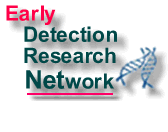
|  | Current
Projects |
|  | Completed
Projects |
|
|
|
EDRN
 The Early Detection Research Network (EDRN) is a national network funded in 1999 for the development, evaluation, and validation of biomarkers for early detection and risk assessment for cancer. Biomarkers are cellular, biochemical, molecular, or genetic alterations by which a normal or abnormal biologic process can be recognized or monitored. Biomarkers are measurable in biological media, such as fluids, tissues, or cells. In addition to the National Cancer Institute (NCI), which funds the EDRN, there are four components to the network: Biomarker Development Laboratories, Biomarker Validation Laboratories, Clinical Validation Centers, and a Data Management and Coordinating Center (DMCC). Under the direction of Principal Investigators Ziding Feng, Ph.D., Yingye Zheng, Ph.D., and James Dai, Ph.D., the DMCC provides logistical, informatics, and statistical services to the EDRN.
The EDRN DMCC, funded in 2000, provides logistical support and coordination for 59 institutions in EDRN; coordinates meetings, conference calls, and workshops; develops and manages the EDRN secure website; collaborates with the Jet Propulsion Laboratories to maintain the EDRN public portal; participates in the review of validation studies and associate member applications; manages and coordinates EDRN validation studies; develops and maintains the Validation Study Information Management System (VSIMS) for data collection and management; specimen tracking and study monitoring; and conducts statistical methodology research for EDRN.
The DMCC, operated by the Fred Hutchinson Cancer Research Center and the University of Washington, and COMPASS, provides coordination and data management for the EDRN under the direction of the Steering Committee and develops statistical and analytical methods in response to the scientific needs of the network. Specific tasks performed by at the DMCC include:
The Early Detection Research Network (EDRN) is a national network funded in 1999 for the development, evaluation, and validation of biomarkers for early detection and risk assessment for cancer. Biomarkers are cellular, biochemical, molecular, or genetic alterations by which a normal or abnormal biologic process can be recognized or monitored. Biomarkers are measurable in biological media, such as fluids, tissues, or cells. In addition to the National Cancer Institute (NCI), which funds the EDRN, there are four components to the network: Biomarker Development Laboratories, Biomarker Validation Laboratories, Clinical Validation Centers, and a Data Management and Coordinating Center (DMCC). Under the direction of Principal Investigators Ziding Feng, Ph.D., Yingye Zheng, Ph.D., and James Dai, Ph.D., the DMCC provides logistical, informatics, and statistical services to the EDRN.
The EDRN DMCC, funded in 2000, provides logistical support and coordination for 59 institutions in EDRN; coordinates meetings, conference calls, and workshops; develops and manages the EDRN secure website; collaborates with the Jet Propulsion Laboratories to maintain the EDRN public portal; participates in the review of validation studies and associate member applications; manages and coordinates EDRN validation studies; develops and maintains the Validation Study Information Management System (VSIMS) for data collection and management; specimen tracking and study monitoring; and conducts statistical methodology research for EDRN.
The DMCC, operated by the Fred Hutchinson Cancer Research Center and the University of Washington, and COMPASS, provides coordination and data management for the EDRN under the direction of the Steering Committee and develops statistical and analytical methods in response to the scientific needs of the network. Specific tasks performed by at the DMCC include:
- Network Coordination. Under the direction of the SC, the DMCC will provide logistical and administrative support for meetings and workshops; provide operational support for EDRN communications, subcommittee meetings, and telephone conference calls; produce and maintain all documents, including the Manual of Operations and procedures manuals; maintain and enhance the EDRN secure web site; maintain and enhance a mailing list system within EDRN; and maintain the online review of applications/proposals submitted to the EDRN.
- Data Management and Protocol Development. Under the direction of the SC, the DMCC will provide coordination and support for EDRN collaborative validation studies, including: work with study investigators on study design and protocol development; produce data forms and Manuals of Operation; develop and maintain a data management system and a system for communications among study investigators from multiple sites; monitor protocol adherence, data collection and submission; perform data quality control and quality assurance (QC/QA); analyze data; provide tables, graphics, and other materials for study reports and manuscript preparations; develop uniform protocols for data and specimen collection and sharing; support the formation and distribution of EDRN biospecimen reference sets and analyze data generated from the reference sets; provide a mechanism for rapid and routine information sharing among EDRN investigators and NCI staff. The DMCC will provide EDRN validation studies statistical services and innovations in validation study development, study design, and data analyses, and will develop new statistical and computational methodology if necessary to meet EDRN validation study needs.
- Validation Infrastructure Support and Services. The DMCC will work with the NCI and JPL EDRN Informatics Center (EDRN IC) to specify and design software for the development of the Network-wide informatics enterprise; lead the development of the EDRN secure web site; maintain and enhance systems to support collection and analysis of data from network collaborative studies; warehouse data to be shared with the scienti?c community; and maintain and enhance systems in collaboration with EDRN IC to publish EDRN information. The DMCC and EDRN IC will work closely with NCI and the NCI Center for Biomedical Informatics and Information Technology (CBIIT).
- EDRN Core Funds Management. The FHCRC Office of Sponsored Research (OSR) has extensive experience in managing NIH grants and contracts (e.g. Women’s Health Initiatives). The DMCC will closely work with the EDRN SC and the NCI Project Coordinator and FHCRC OSR to ensure the timely activation of core funds after EDRN SC approval so that EDRN network collaborative studies will not be delayed, and to ensure compliance with all regulatory requirements for sub-award management.
|
|